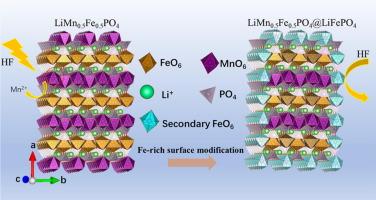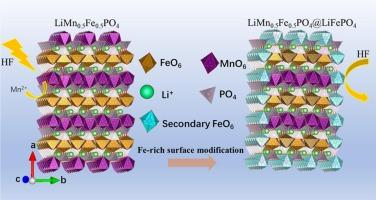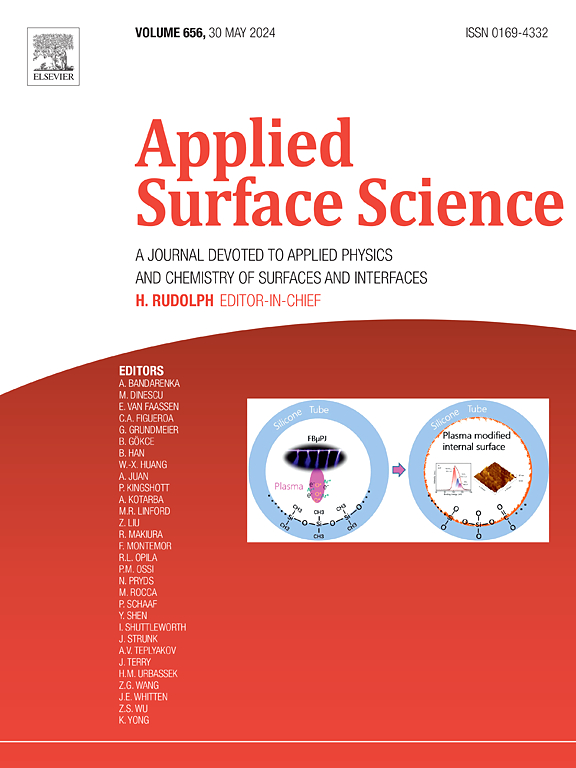Surface iron concentration gradient: A strategy to suppress Mn3+ Jahn-Teller effect in lithium manganese iron phosphate
IF 6.3
2区 材料科学
Q2 CHEMISTRY, PHYSICAL
引用次数: 0
Abstract
To address the low energy density of LiFePO4 (LFP) for electric vehicles and high-voltage energy storage, LiMn0.5Fe0.5PO4 (LMFP) provides a potential solution but faces performance degradation due to Mn3+-induced Jahn-Teller distortion and Mn ion dissolution during cycling. This study proposes a surface engineering strategy to enhance LMFP’s electrochemical performance by increasing surface iron concentration and reducing manganese content, based on the electronic differences between Mn3+ and Fe3+ in MO6 octahedra. Density Functional Theory (DFT) calculations confirmed the viability of this approach by analyzing volume changes and binding energies with HF during charging. Guided by DFT, an LMFP@LFP/C material was synthesized with a high-iron-concentration surface layer (∼2 nm), as observed through AC-STEM. Post-cycling TEM analysis and corrosion simulations demonstrated that LMFP@LFP/C suppresses Mn ion dissolution and stabilizes the crystal lattice compared to unmodified LMFP/C. Electrochemical tests showed that LMFP@LFP/C has superior electronic conductivity and faster lithium-ion diffusion. It delivered an initial discharge capacity of 150.82 mAh g−1 at 0.1C, surpassing LMFP/C (147.65 mAh g−1). At 1C, LMFP@LFP/C retained 95.85 % of its capacity after 500 cycles, significantly outperforming LMFP/C (74.18 %). This surface modification strategy advances phosphate-based cathode materials for electric vehicles and renewable energy applications.


表面铁浓度梯度:抑制磷酸锰铁锂中 Mn3+ Jahn-Teller 效应的策略
为了解决用于电动汽车和高压储能的 LiFePO4(LFP)能量密度低的问题,LiMn0.5Fe0.5PO4(LMFP)提供了一种潜在的解决方案,但由于 Mn3+ 引发的 Jahn-Teller 畸变和循环过程中的锰离子溶解,LMFP 面临着性能下降的问题。本研究根据 Mn3+ 和 Fe3+ 在 MO6 八面体中的电子差异,提出了一种通过增加表面铁浓度和减少锰含量来提高 LMFP 电化学性能的表面工程策略。密度泛函理论(DFT)计算通过分析充电过程中的体积变化和与 HF 的结合能,证实了这种方法的可行性。在 DFT 的指导下,合成了一种 LMFP@LFP/C 材料,并通过 AC-STEM 观察到其具有高浓度铁表面层(2 nm)。循环后的 TEM 分析和腐蚀模拟表明,与未改性的 LMFP/C 相比,LMFP@LFP/C 可抑制锰离子溶解并稳定晶格。电化学测试表明,LMFP@LFP/C 具有优异的电子导电性和更快的锂离子扩散速度。它在 0.1C 时的初始放电容量为 150.82 mAh g-1,超过了 LMFP/C(147.65 mAh g-1)。在 1C 条件下,LMFP@LFP/C 在循环 500 次后仍能保持 95.85% 的容量,明显优于 LMFP/C(74.18%)。这种表面改性策略推动了磷酸盐基阴极材料在电动汽车和可再生能源领域的应用。
本文章由计算机程序翻译,如有差异,请以英文原文为准。
求助全文
约1分钟内获得全文
求助全文
来源期刊

Applied Surface Science
工程技术-材料科学:膜
CiteScore
12.50
自引率
7.50%
发文量
3393
审稿时长
67 days
期刊介绍:
Applied Surface Science covers topics contributing to a better understanding of surfaces, interfaces, nanostructures and their applications. The journal is concerned with scientific research on the atomic and molecular level of material properties determined with specific surface analytical techniques and/or computational methods, as well as the processing of such structures.
 求助内容:
求助内容: 应助结果提醒方式:
应助结果提醒方式:


